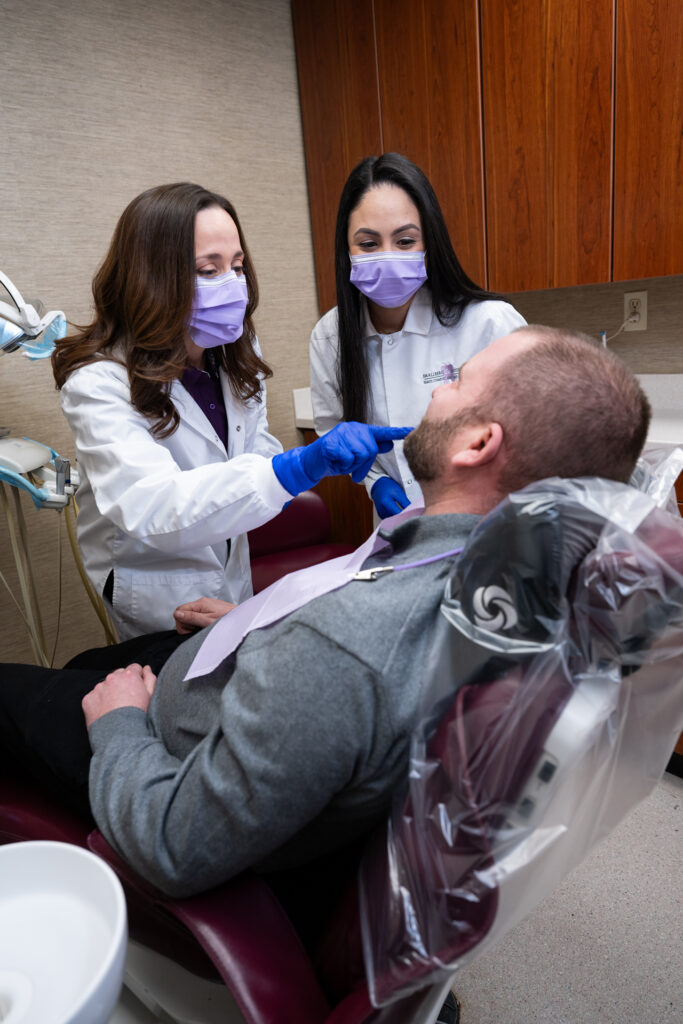Addressing Your Dental Concerns in Westbury, NY
Smallberg & Satornino, DDS, PLLC, is your trusted dentist for any dental concerns in Westbury, NY. With 15 years of experience helping Long Island patients, Dr. Smallberg and Dr. Satornino have the knowledge and expertise to restore your good oral health condition.
Bleeding Gums
Do your gums bleed when you brush your teeth? If so, you may be suffering from periodontal (gum) disease. Bleeding gums are often caused by plaque build-up along the gum line. Plaque gets into the pockets of the gum and hardens into tartar. Brushing or flossing your teeth irritates the sensitive gum tissue and can cause bleeding or soreness.
Bleeding gums are also common during pregnancy because of hormonal changes. It is important to maintain routine visits to the dentist during pregnancy to monitor gum health.
If your gums are bleeding, it is best that you make an appointment with the doctor to be evaluated for gum disease.
Gum disease has a better prognosis as it is treated earlier.
Headaches
What’s causing my pain? Pain and pressure result when your teeth don’t fit together properly and/or the two small joints in front of your ears – TMJ joints – don’t function smoothly. You may experience migraine headaches or unexplained facial, neck, shoulder, or jaw pain. Tooth wear, teeth grinding, tingling extremities, and chronic earaches are also on the long list of common problems caused by TMJ disorder.
Missing Teeth
Missing teeth should be treated as quickly as possible. Once a tooth is lost, the bone begins to deteriorate. It will continue to deteriorate if no treatment is sought, making replacement options more and more difficult and potentially affecting other teeth.
Tooth Cavities
Tooth cavities are, unfortunately, a very common dental problem for both kids and adults. Your dentist can usually identify cavities before you experience symptoms, so it is important to visit the dentist regularly for screenings and tooth cleanings.
Common Signs of Tooth Cavities Include:
- Tooth pain
- Sensitivity to hot or cold foods/drinks
- Holes in the teeth
- Sore gums or bleeding gums
What Causes a Tooth Cavity?
Diet and hygiene are two of the most significant factors contributing to tooth cavities. Plaque is constantly forming in the mouth. When it interacts with sugar or starch from the food and drink we consume, the bacteria it forms will eat away at the tooth. This can lead to a cavity. Brushing twice a day and flossing is the best way to prevent cavities. In addition, you should maintain a healthy diet that includes plenty of water, fresh fruits, and vegetables. Limit the number of sodas and candy in your diet to avoid cavities.
Treatment for Tooth Cavities
If you have a tooth cavity or if your teeth show signs of decay, your dentist may recommend several general dentistry treatments to restore the tooth to proper health and minimize the risk of further decay. A dental filling is usually the first line of treatment for a tooth cavity. Drs. Smallberg and Satornino may use a composite resin dental filling, porcelain filling/onlay, or gold filling/onlay. Dental crowns are used on teeth that are more severely affected by tooth decay. If tooth decay is advanced and infects the tooth pulp, a root canal may be needed to restore proper health and alleviate pain.

Tooth Grinding
Tooth grinding, or “bruxism,” is clenching or grinding your teeth. Most people are not even aware that they are doing this. In the United States, bruxism affects about 30 million to 40 million children and adults.
Some people grind their teeth only during sleep, a condition called “nocturnal bruxism” or “sleep-related bruxism.” Others grind or clench their teeth during the daytime as well, a condition thought to be related to stress or anxiety.
Bruxism can have a variety of causes. Some experts view it as nothing more than a habit. It can also result from the body’s reaction when the teeth do not align properly. Bruxism can also be a symptom of certain rare diseases of the facial nerves and muscles. In rare cases, bruxism may be a side effect of some medicines that treat depression.
People with severe bruxism can break dental fillings or damage their teeth. Rubbing the teeth together can cause the outer layers of enamel to wear away, exposing dentin. This can result in tooth sensitivity. Severe bruxism also has been blamed for:
- Some cases of jaw dysfunction, also called temporomandibular disorders (TMD)
- Headaches when you wake up in the morning
- Unexplained facial pain
If your bruxism is related to tooth problems, your dentist probably will correct tooth alignment. In severe cases, your dentist may need to use onlays or crowns to reshape the biting surfaces of your teeth entirely. The dentist also may make a mouth guard or bite splint that fits your mouth and teeth. This will help prevent further damage to the teeth. In some cases, it may help your teeth and muscles to realign.
Comprehensive Solutions for Optimal Oral Health
Visit Smallberg & Satornino, DDS, PLLC, if you are experiencing any of the abovementioned oral health issues in Westbury. We can provide the right treatment for your bleeding gums, tooth cavity, or missing teeth. Dr. Smallberg or Dr. Satornino can also help with dental anxiety so you can go through dental appointments comfortably.
Do you have any problems with your teeth? Smallberg & Satornino, DDS, PLLC can help you regain your healthy, confident smile. Contact us today for personalized dental care to enhance your oral health and aesthetic appeal.

